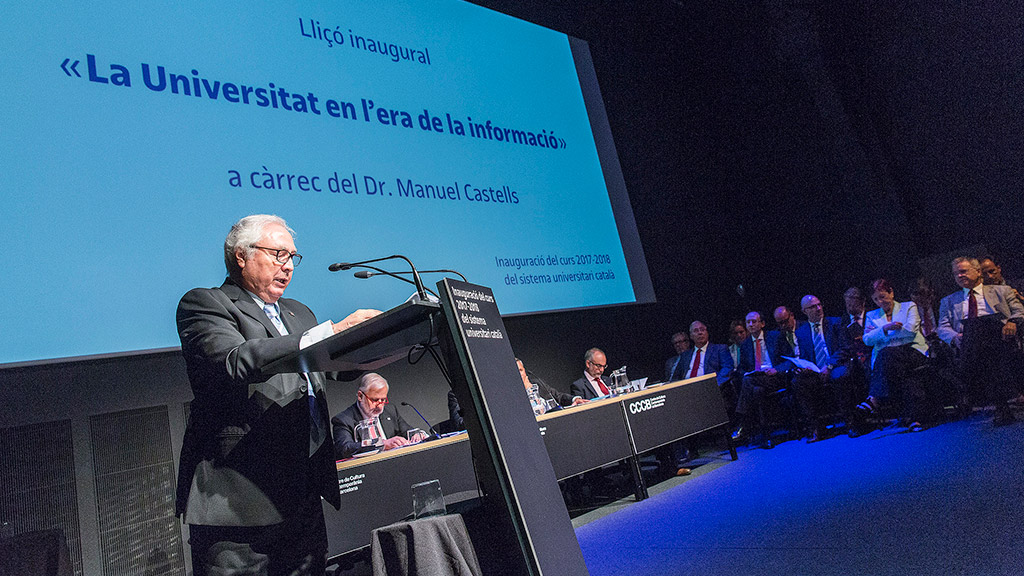UOC professor Manuel Castells is appointed Minister for Universities
The UOC Professor in Sociology is a prestigious and internationally renowned academic
Spanish Prime Minister Pedro Sánchez has announced the composition of his new council of ministers. Among its newest members is Manuel Castells, Professor in Sociology at the Universitat Oberta de Catalunya (UOC), who has been appointed Minister for Universities. Professor Castells is the author of the trilogy The Information Age: Economy, Society and Culture, one of the most influential works on understanding how society has changed as a result of the digital revolution over the past few decades.
An international academic career
Manuel Castells has been a visiting professor at 17 universities around the world and has been invited to hundreds of academic and professional institutions across 45 countries, such as the Massachusetts Institute of Technology, the University of Oxford, the University of Cambridge and the University of Paris. Professor Castells was also director of one of the UOC's research centres, the Internet Interdisciplinary Institute (IN3), between 2008 and 2013 and headed the University's Scientific Advisory Board. He currently leads the research group Communication Networks & Social Change (CSNC) at the IN3. He is Wallis Annenberg Chair in Communication Technology and Society at the University of Southern California in Los Angeles and a professor emeritus of Sociology and Urban and Regional Planning at the University of California, Berkeley, where he exercised for 24 years. He is a fellow of St. John's College at the University of Cambridge and holds the Network Society Chair at the Collège d'Études Mondiales in Paris.
Project Internet Catalonia
Project Internet Catalonia (PIC) was one of the most ambitious research initiatives coordinated by Professor Castells at the UOC. The project ran between 2001 and 2007 and was financed by the Government of Catalonia and personally supported by Catalonia's presidents during that time. The PIC analysed Catalonia's transition to the network society by studying the effects of information and communication technologies (ICT) on business competitiveness and productivity and the use of the internet and computers in schools and universities, as well as the introduction of e-administration in Catalonia in general and specifically in Barcelona City Council. The project also focused on the interaction between the internet and television and the digitalization of the Catalan health system. Overall, on the PIC were conducted over 55,000 interviews as part of the study.
An extensive bibliography
Professor Castells has written 26 books, including the trilogy The Information Age: Economy, Society and Culture, which has been translated into 23 languages. Next year, in 2021, it will be the 25th anniversary of the first volume's publication and the UOC will celebrate with a scientific event, which will also coincide with the 25th anniversary of the University's founding and the 20th anniversary of the IN3. The researchers will analyse the relevance of Castells' pioneering academic writing, from the perspective of the current network society and how best to research it.
A career shining with recognition
Professor Castells has been awarded honorary doctorates from 18 universities all over the world. His long list of distinctions began in 1982 when he was presented with the prestigious Guggenheim Fellowship. He also received the C. Wright Mills Award from the American Society for the Study of Social Problems in 1983; the Robert and Helen Lynd Award from the American Sociological Association in 1998; the Order of the Lion of Finland and the Order of Arts and Letters from the French Government in 2002; the Ithiel de Sola Pool Award from the American Political Science Association in 2004; the Order of Gabriela Mistral from the President of Chile in 2005; the Order of Santiago from the President of Portugal and the St George's Cross from the Government of Catalonia in 2006; Spain's National Sociology and Political Science Prize in 2008; the Erasmus Medal from Academia Europaea in 2011; the Holberg Prize from the Government of Norway in 2012; the Balzan Prize for sociology in 2013, and in 2014, the Eulalio Ferrer Prize and International Award UCLG - MEXICO City - Culture21.
The new Minister for Universities is also a numerary academician of the Spanish Royal Academy of Economics and Finance and an academic of Academia Europaea, of the British Academy, of the Mexican Academy of Sciences and of the American Academy of Political and Social Science.
Other responsibilities outside of academia
Manuel Castells was a member of the United Nations Secretary General´s Advisory Board on Information Technology and Global Development, as well as that of the Global Civil Society. In 2005 he was appointed by the European Commission to be a founding member of the Scientific Council of the European Research Council. From 2008 to 2012, he was a member of the Governing Board of the new European Institute of Innovation and Technology (EIT), created by the European Union to stimulate cooperation between universities, businesses and society.
Press contact
-
Editorial department
